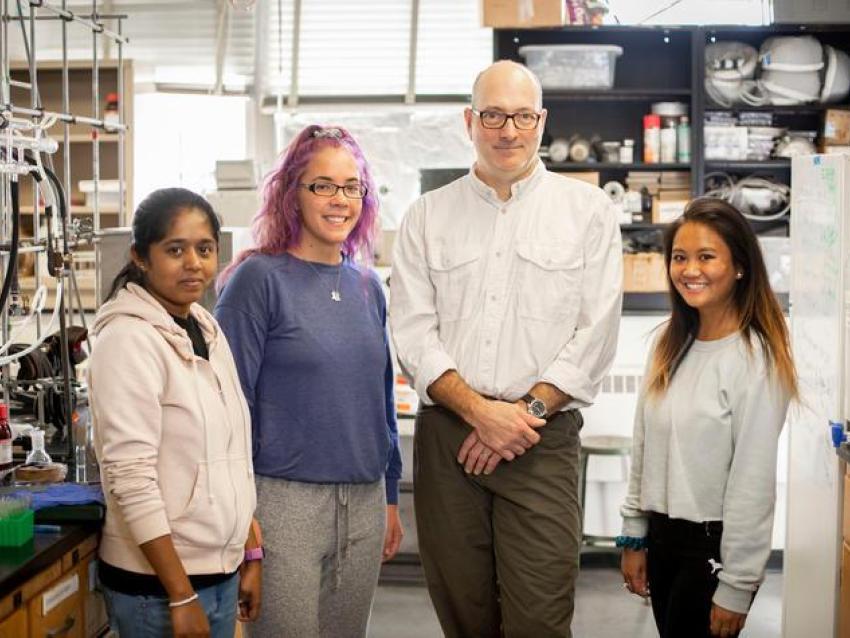
Mentee Turns Mentor to Make a Difference in the Lives of UK Students
LEXINGTON, Ky. (Oct. 25, 2019) — Behind many a success story is a fantastic mentor. That was the case for David Atwood, a chemistry professor in the College of Arts and Sciences at the University of Kentucky.
"In my first year in college I was interested in physics and chemistry. However, at the time, I didn't have a clear understanding of either major, certainly not with regards to future careers," Atwood said. "In my second year, I took an undergraduate research class that changed the trajectory of my future."
It was because of his mentor that Atwood was able to achieve such success in his career field. Atwood's mentor inspired him to dream big. That very same mentor also helped him discover his second passion in life — mentoring.
There are very few aspects of the college experience more important than forming meaningful mentor relationships. At universities across the nation, professors play an integral role as mentors, providing both academic and career advice to their students. Helping students navigate the complexities of higher education and the uncertainty and anticipation of what post-college life has in store, mentors not only serve as advisers to their students, but also as sounding boards for ideas and apprehensions.
Now in his 21st year of mentoring at the university, Atwood has mentored more than 60 students, empowering them with the confidence and skills necessary to succeed. He has also impacted the lives of countless more students through his involvement with the Howard Hughes Medical Institute grant, which supported the creation of the STEMCats.
"Mentoring is an important aspect of being a professor at any college or university," Atwood said. "It is the way a professor can influence and encourage an individual student to greater achievement. It is incredibly rewarding to observe students having greater success than they would have without my influence."
Research has found mentor-student relationships, along with friendships, to be fundamental in overall student success, calling them central daily motivators for discussing, studying, exploring and learning. Atwood sees the positive impacts of mentorship and believes that students across campus and beyond should be exposed to mentor-led undergraduate research.
"I think all students should have the opportunity to conduct research in a supportive environment that fosters creativity, supports learning and maximizes efficiency," Atwood said. "Research guides and requires students to learn new techniques and observe firsthand how coursework chemistry concepts are actively and actually used in the laboratory."
Across the globe, Oct. 27 marks National Mentoring Day, launched in England to celebrate mentoring with a key focus on raising awareness of its significant benefits. Mentoring is not a magic wand that automatically creates success; it takes effort, and creating successful mentoring relationships requires certain characteristics and structure.
Atwood possesses mentorship skills that allow him to make a difference in the lives of students, providing them with the resources to become anything they set their minds to. Through his mentorship, students are able to discover what is wildly possible, just as Atwood's mentor did for him.
At UK, the Office of Undergraduate Research is dedicated to providing undergraduate students with the opportunity to conduct faculty-led research. The office provides coordination, leadership and support for students' research endeavors. Through a wide variety of customized programs and activities, the Office of Undergraduate Research serves to enrich the overall academic experience.
"For 20 years, Undergraduate Research has been an important component in our university’s strategic plans," said Evie Russell, assistant director of the Office of Undergraduate Research. "Undergraduate research is considered a high-impact practice and plays a significant role in the recruitment, retention and graduation rates of our students. As a Research 1 university, UK’s undergraduate students have tremendous opportunities to engage with innovative research that is transforming tomorrow."
Atwood embodies a quote from a 2015 Presidential Proclamation recognizing National Mentoring Month, "mentors can instill a sense of infinite possibility in the hearts and minds of their mentees, demonstrating that with hard work and passion, nothing is beyond their potential."
To learn more about mentoring opportunities at the university, visit the Office of Undergraduate Research's website.
The University of Kentucky is increasingly the first choice for students, faculty and staff to pursue their passions and their professional goals. In the last two years, Forbes has named UK among the best employers for diversity, and INSIGHT into Diversity recognized us as a Diversity Champion three years running. UK is ranked among the top 30 campuses in the nation for LGBTQ* inclusion and safety. UK has been judged a “Great College to Work for" two years in a row, and UK is among only 22 universities in the country on Forbes' list of "America's Best Employers." We are ranked among the top 10 percent of public institutions for research expenditures — a tangible symbol of our breadth and depth as a university focused on discovery that changes lives and communities. And our patients know and appreciate the fact that UK HealthCare has been named the state’s top hospital for four straight years. Accolades and honors are great. But they are more important for what they represent: the idea that creating a community of belonging and commitment to excellence is how we honor our mission to be not simply the University of Kentucky, but the University for Kentucky.